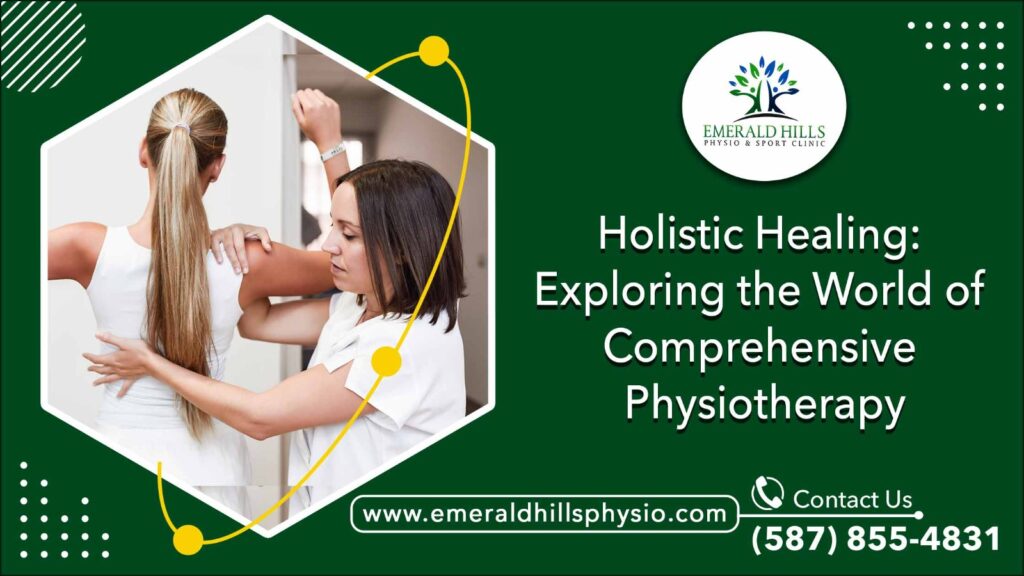 In the pursuit of health and wellness, physiotherapy stands as a beacon of holistic healing. Emerald Hills Physiotherapy in Sherwood Park transcends beyond traditional methods, embracing a comprehensive approach that addresses the emotional, physical, and psychological aspects of healing.
In the pursuit of health and wellness, physiotherapy stands as a beacon of holistic healing. Emerald Hills Physiotherapy in Sherwood Park transcends beyond traditional methods, embracing a comprehensive approach that addresses the emotional, physical, and psychological aspects of healing.
The Essence of Comprehensive Physiotherapy
Physical Rehabilitation and Pain Management
Customized Exercise Regimens: Tailored exercise plans focus on the patient’s specific injuries or areas of pain, incorporating strength, flexibility, and endurance training. These exercises are regularly updated based on the patient’s progress, ensuring continual improvement and adaptation to their evolving physical condition. The goal is to restore function and enhance the ability to perform routine activities without discomfort.
Cutting-edge Pain Relief Techniques: Techniques like manual therapy, including massage and joint mobilization, directly target areas of discomfort, facilitating pain relief and improved mobility. Electrical stimulation and ultrasound therapy provide deep tissue healing, reducing inflammation and promoting tissue repair. These methods are often more effective when combined, offering a multi-pronged approach to pain management.
Functional Mobility Improvement: Emphasis on functional training ensures that patients not only recover from their injuries but also regain the ability to perform daily tasks efficiently. Training includes balance and coordination exercises, which are crucial for preventing falls and maintaining independence, especially in older adults. Educating patients on safe and effective ways to move and lift objects also forms an essential part of this approach.
Emotional and Psychological Well-Being
Stress and Anxiety Reduction: Techniques like guided relaxation and deep breathing exercises help in managing the psychological impacts of injury, such as stress and anxiety. This holistic approach recognizes that mental well-being is intrinsically linked to physical health, and addressing these aspects can accelerate recovery. Regular mindfulness practices can also enhance patients’ overall outlook and coping mechanisms.
Coping Strategies for Chronic Conditions: Chronic conditions often bring persistent challenges; thus, providing psychological support and coping strategies is vital. Therapists may offer cognitive-behavioural strategies to help patients deal with the frustrations and limitations of chronic conditions. This support extends beyond the clinic, with therapists often recommending resources and activities that patients can engage in at home.
Building a Supportive Environment: Creating a supportive and empathetic treatment environment encourages patients to share their concerns and challenges freely. This openness helps therapists to tailor treatments more effectively to individual emotional needs. Group therapy sessions may also be offered, fostering a sense of community and shared experience among patients.
Lifestyle and Nutritional Guidance
Dietary Recommendations: Nutritional counselling focuses on foods that promote healing, such as those rich in protein, vitamins, and minerals, essential for tissue repair. Anti-inflammatory foods are highlighted to help reduce swelling and pain, while guidance is provided on avoiding foods that might exacerbate inflammation. Nutrition is critical in recovery, and personalized dietary plans are designed to support each patient’s specific health goals.
Lifestyle Modification Advice: Guidance on making lifestyle changes covers a wide spectrum, from enhancing sleep quality to integrating consistent physical exercise into everyday routines. Techniques for managing stress, including efficient time management and relaxation practices, are imparted to assist patients in achieving a healthy equilibrium between their personal and work lives. Even minor tweaks to daily habits can significantly influence the healing process and contribute to overall health and wellness.
Ergonomic Assessments: Ergonomic assessments in the workplace or home setting are conducted to ensure that patients’ environments support their recovery and don’t contribute to further strain or injury. Recommendations on ergonomic furniture, correct posture, and work habits are provided. These assessments are particularly beneficial for patients with repetitive strain injuries or those who spend long hours at a desk.
Preventive Care and Health Education
Injury Prevention Education: Physiotherapists provide education on proper body mechanics to prevent workplace or sports-related injuries. Regular workshops are conducted on topics like safe lifting techniques and posture correction. This preventive approach aims to empower patients with the knowledge to avoid future injuries.
Health and Wellness Workshops: Workshops on various health-related topics provide education on the comprehensive nature of health, addressing areas such as cardiovascular fitness, weight management, and psychological health. These interactive forums offer an opportunity for patients to engage actively, asking questions and participating in discussions about their health. The objective is to motivate patients to play a proactive role in overseeing their health and wellness.
Regular Health Screenings: Health screenings for early detection of potential physical issues are integral to preventive care. These screenings may include posture analysis, flexibility tests, and strength assessments. Early identification of issues allows for prompt intervention, reducing the risk of the development of more serious conditions.
Chronic Disease Management
Physiotherapists design specialized programs to manage conditions like arthritis, diabetes, and cardiovascular disease, focusing on exercises and lifestyle changes that mitigate symptoms and improve quality of life.
Monitoring and Adjusting Treatment: Ongoing monitoring allows for adjustments in treatment plans based on the progression of the chronic condition, ensuring that patients receive the most effective care at every stage.
Education on Self-Management: Patients are educated about their conditions and how to manage them effectively at home, including strategies for pain management, dietary adjustments, and recognizing warning signs that require medical attention.
A Destination for Healing and Wellness
Emerald Hills Physiotherapy in Sherwood Park represents more than just a physiotherapy clinic; it’s a destination for holistic healing and wellness. By embracing a comprehensive approach that addresses every aspect of a patient’s well-being, the clinic stands as a testament to the transformative power of modern physiotherapy in Sherwood Park. It’s where patients embark on a journey toward physical recovery and a harmonious state of health and vitality.
